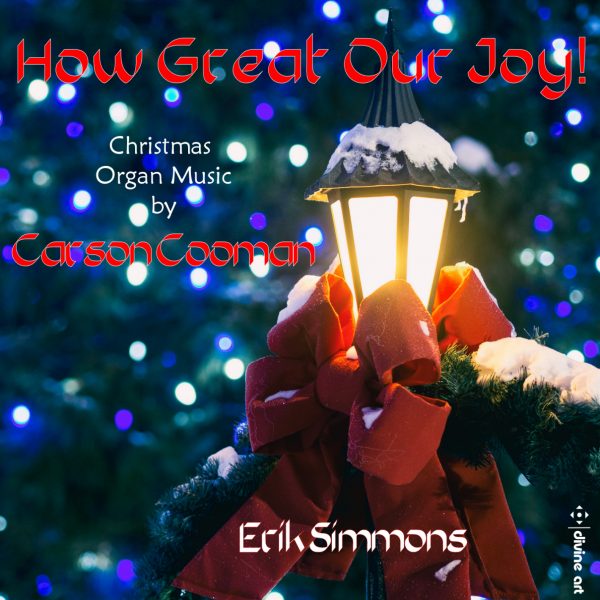Fanfare
The indefatigable Erik Simmons continues to make a valiant effort to keep up in recording the organ works of Carson Cooman, at approximately the rate his gifted organist/composer friend is creating new ones. At some point in the recent past, one or both of them noticed that Cooman’s Christmas-themed organ works, written over a span of a decade and a half, could themselves fill up an entire CD, and so here is the result of that discovery. It has proven to be a most enjoyable addition to my Cooman collection. Of course, it’s not exactly in the midst of the Christmas season as I’m listening to and reviewing this disc (I’m writing these words in March), nor will it be as you’re reading about it sometime around August, but never mind that.
The recital offers a pleasing mix of meditative and joyous pieces. As usual, Cooman is international in his outlook, and has created works based on Christmas carols from places as diverse as the British Isles, Poland, the Basque region of Spain, Gregorian Chant, and even the Sorbian-speaking region of Germany. (The Slavic Sorbs that live near the German border with Poland have been largely “absorbed”—if you will—into the culture and language of Germany).
The program’s opening Fantasia on “Greensleeves” utilizes one of the best-known tunes of the lot, thanks to the like-titled work by Ralph Vaughan Williams. Here, Cooman sets up the tune with some evocative sonorities with the merest hint of this chestnut invoked before it is eventually heard in a complete statement. As is his wont, the composer provides a rich tonal tapestry of which the tune is but one strand, and the work builds up to an impressive concluding climax.
The composer’s imaginative harmonization continues through the gentle setting of the Latin chant-based Veni Emmanuel, which like its predecessor utilizes the tune in a free manner, such that the setting can in no way be considered a mere arrangement. The meditative quality of much of the music in the recital (including Veni) means it would be as appropriate for a worship service as for the concert hall. The Little Partita on a Polish Carol opens in such fashion, but later picks up in rhythmic activity. In the pieces based on lesser-known carols, it is more difficult to ascertain exactly how Cooman is utilizing the tune, but in every case, these works are effective in invoking the spirit of the season, and most pleasing to listen to (as they are undoubtedly to play). One of the most exuberant of all the works is the Voluntary on “O du frohliche,” in which Simmons gets to pull out all the stops, propelling the listener to the edge of his seat.
Collectively, Cooman’s organ music leads me to believe that he may well be the most significant currently active composer for his instrument. Indeed, I listened to the entire recital twice, and found it every bit as enjoyable on the second go-through as on the first.
Erik Simmons plays as well as ever, with finesse and imaginative registration, and must be considered the leading exponent of Cooman’s music, organ or otherwise, given his dozen or more recordings of it to date. The Hauptwerk system that he uses allows him to duplicate the entire stop list of very many notable organs around the world without leaving his home (presumably where these recordings were made). The present recital employs the stops and digitized sounds from the Sonnenorgel of Pfarrkirche St. Peter und Paul located in Gorlitz, Germany, a splendid instrument, and one perfectly suited to this music. Strongly recommended to fans of Cooman, Simmons, Christmas music, or the organ in general.
@divineartrecordingsgroup
A First Inversion Company
Registered Office:
176-178 Pontefract Road, Cudworth, Barnsley S72 8BE
+44 1226 596703
Fort Worth, TX 76110
+1.682.233.4978












